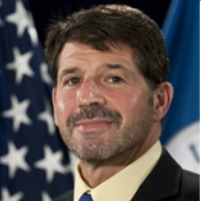Director of the Domestic Nuclear Detection Office: Who Is Warren Stern?
Sunday, March 13, 2011

Warren M. Stern was named Director of the Department of Homeland Security’s Domestic Nuclear Detection Office(DNDO) in August 2010, a position that had been vacant for 18 months. His responsibility is to oversee the department’s nuclear security operations, which includes the detection of unlawful attempts to develop, possess, store, import or transport radiological or nuclear material. The DNDO also engages in the support of nuclear forensic capabilities of the U.S. Government. A strong supporter of getting state and local governments involved in threat detection, Stern has said that if he could have his way, every policeman would have a radiation detector, although he acknowledges that at this time that is not economically feasible.
Stern is a graduate of Brandeis University, where he earned his B.A. in Physics. He subsequently received his S.M. in Nuclear Engineering from the Massachusetts Institute of Technology, and his M.S. in National Security Studies from the National War College.
Stern worked for the Central Intelligence Agency from 1985 to 1990. He then joined the U.S. Arms Control and Disarmament Agency, where he worked as its Senior Technical Advisor from 1990 until 1999.
In 1992, Stern became involved in an unusual controversy unrelated to nuclear security. He led a petition drive to keep Arlington National Cemetery open until 6 p.m. in the winter instead of closing at 5 p.m….in order to allow bicycle commuters to ride through on their way home from work. The following year, he testified on behalf of the Washington Area Bicyclist Association at a hearing of the House Subcommittee on Compensation and Employee Benefits. Stern presented the opinion that federally-employed bicycle commuters should receive the same transportation subsidies that were awarded to users of public transportation.
In 2003, Stern served as a Fellow in Senator Hillary Clinton’s office, advising on nuclear security and safety matters, and assisting in the writing of the Dirty Bomb Prevention Act.
Stern then joined the Department of State as its Senior Coordinator for Nuclear Safety and Deputy Director of the Office of Nuclear Energy, Safety and Security. While serving in this capacity, he helped to design a protective shelter for use at the Chernobyl nuclear reactor site.
From August 2006 to March 2010, Stern headed the International Atomic Energy Agency’s (IAEA) Incident and Emergency Center. In this post, he helped to create the IAEA’s Response Assistance Network, and spearheaded international preparedness and response plans for nuclear emergencies.
Subsequently, Stern served as Senior Advisor to the Assistant Secretary of State for International Security and Nonproliferation.
Danny Biederman, David Wallechinsky
- Top Stories
- Unusual News
- Where is the Money Going?
- Controversies
- U.S. and the World
- Appointments and Resignations
- Latest News
- Trump to Stop Deportations If…
- Trump Denounces World Series
- What If China Invaded the United States?
- Donald Trump Has a Mental Health Problem and It Has a Name
- Trump Goes on Renaming Frenzy






Comments